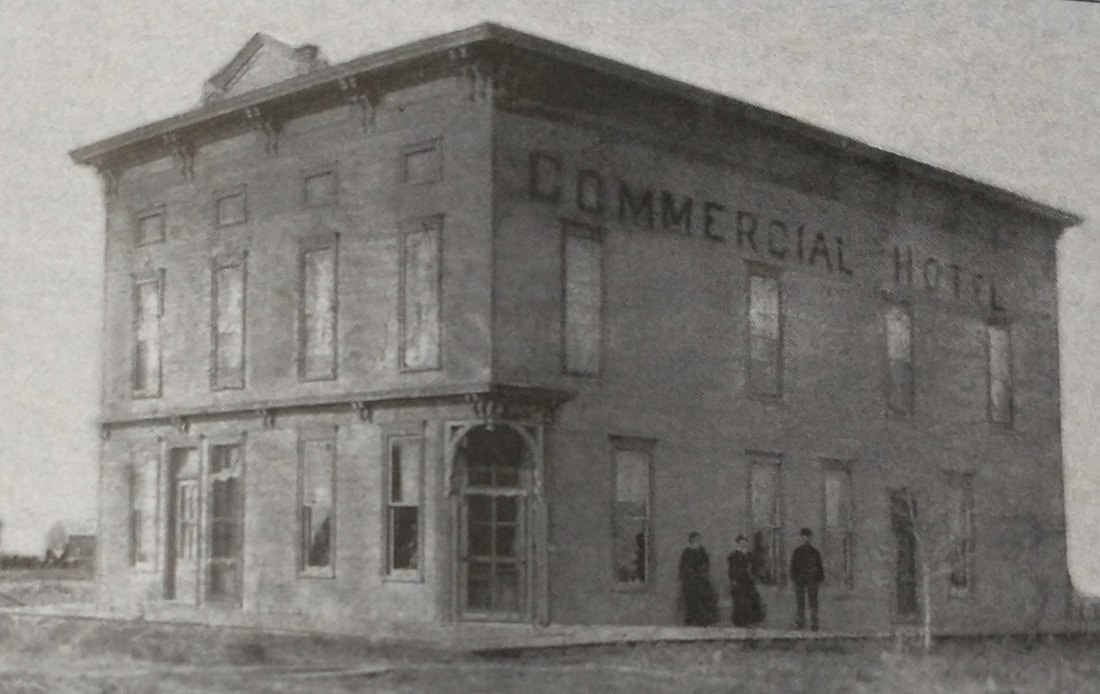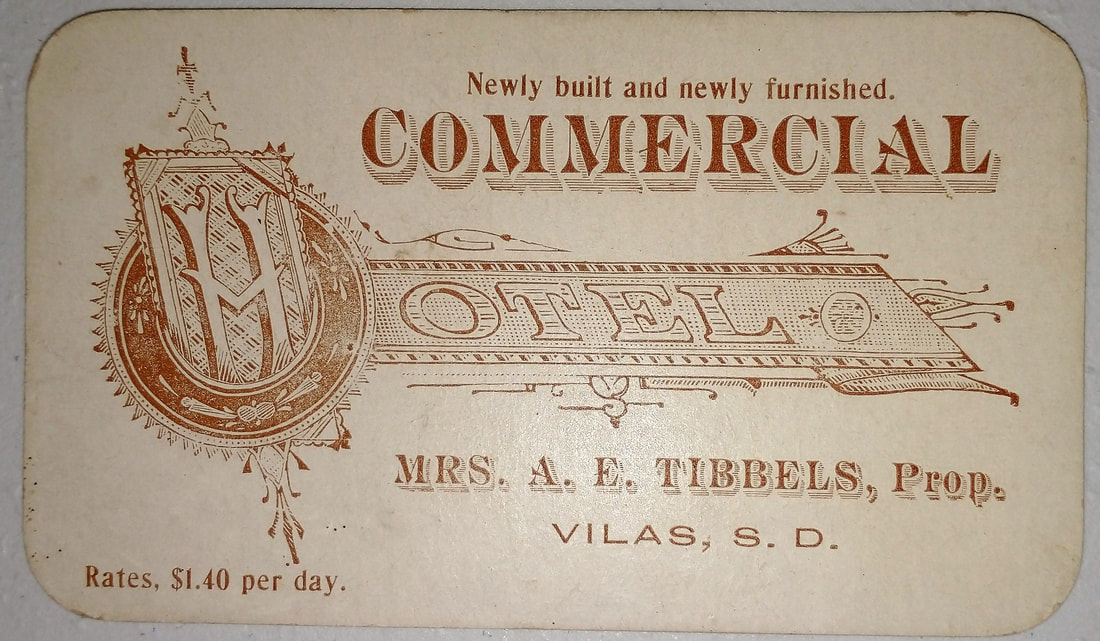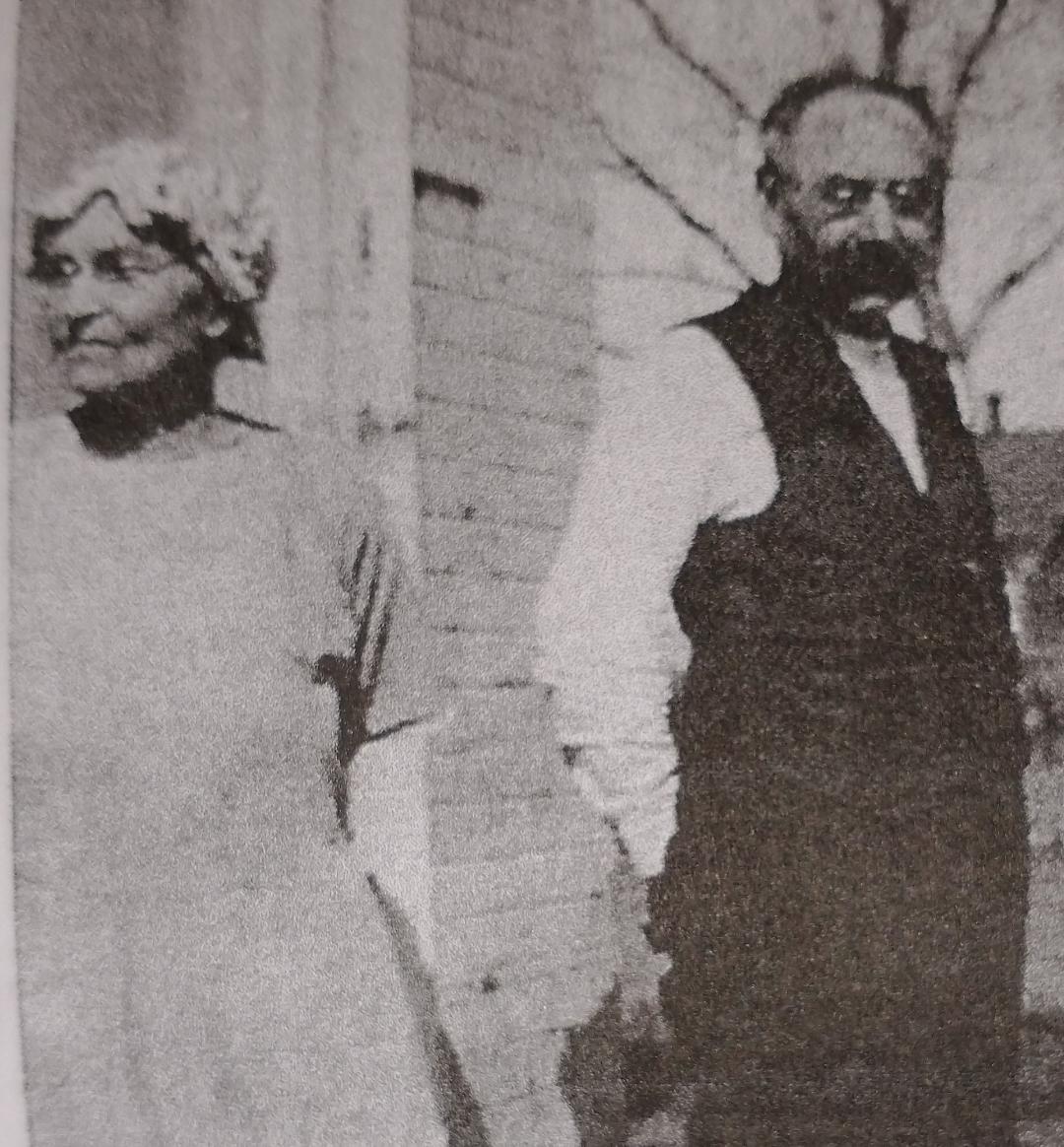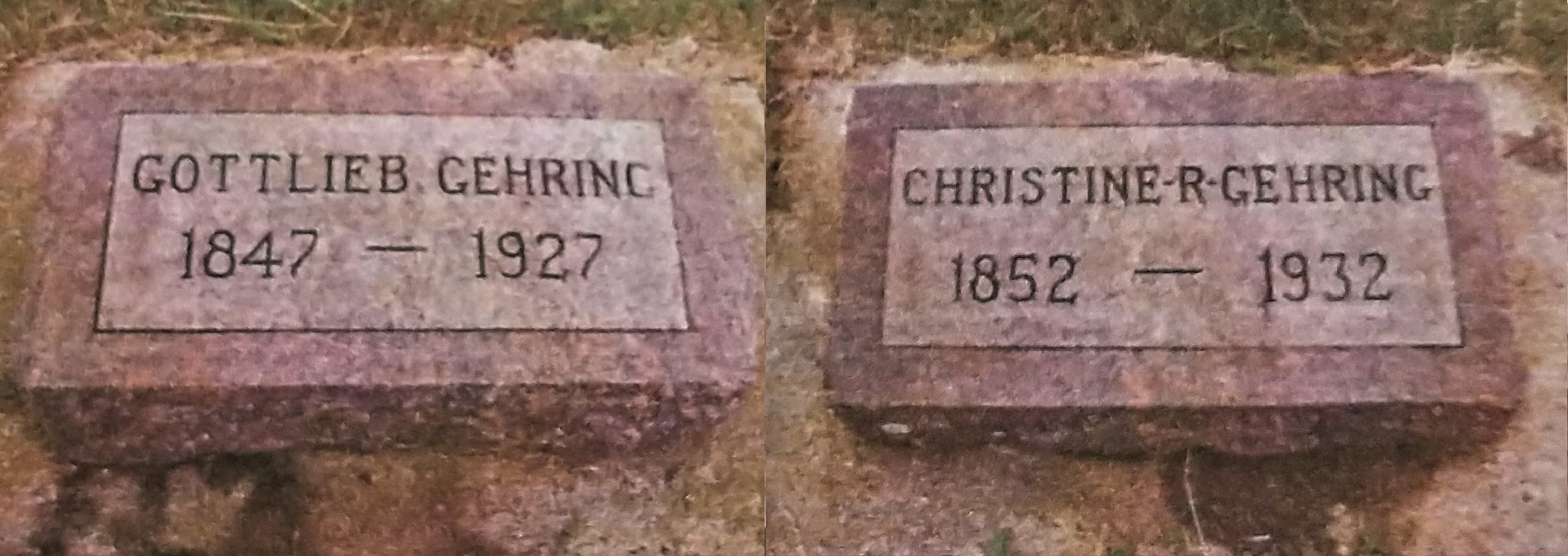The Commercial Hotel was built in Vilas, South Dakota, sometime during the 1880s or 1890s. Though the origins of the business are unclear, it had a major impact on Miner County both economically and culturally during its operation.
Vilas, being in the geographical center of Miner County and having two railway lines and stations, along with many other businesses, saw quite a bit of foot traffic as salesmen and weary travelers sought a place to stay for the night. The need for lodging most likely resulted in the establishment of the Commercial Hotel during or shortly after the business boom in Vilas during the 1880s.
Elza G. Tibbels, born in 1857, and his wife Aldie (Rowell) Tibbels, born in 1864, were the first documented proprietors of the hotel. They had moved from their home in Ohio in 1886 and purchased land between Vilas and Howard to farm. Following Elza’s death in 1901, Aldie Tibbels was the sole proprietor of the Commercial Hotel until she moved back to Ohio a few years later.
Despite Tibbles moving back to Ohio, the Commercial Hotel found new management quickly. Gottlieb Gehring, who emigrated from Germany in 1869 and eventually homesteaded in Rock Creek Township, Miner County, took charge of the hotel when he moved to Vilas in 1905.
According to the Gehring family history book, Gottlieb was quite the character. It is told that traveling salesmen would elect to lodge at the Commercial Hotel on the chance that they would leave with a story to tell on sales calls. Gottlieb's sense of humor didn't disappoint.
One such instance occurred when a guest requested to be wakened to be able to catch the early train. The next morning, Gottlieb, not having remembered to wake his guest until time was running short, ran upstairs and pounded on the door, exclaiming, "Get up! Get up! Your train just left!"
On another occasion, Gottlieb was determining the bill for a salesman's evening meal. When asked if he had sat at the table with oranges or without, the salesman replied "without". His answer was met with a possible disappointment from Gottlieb, who replied, "Oh, you should have eaten at the table with the oranges -- Oh well, I'll charge you for them anyway." This response was possibly a nightly occurrence, and whether Gottlieb actually charged salesmen for the oranges is unknown, but it was a source of humor for manager and customer alike.
Another story that emerged from the walls of the Commercial Hotel could very well have ended in a variety of different ways. During the first decade of the twentieth century, the prohibition movement was in full swing. Among the plethora of activists for prohibition was Carry Nation, a radical, hatchet-wielding prohibitionist who had made a name for herself by attacking saloons and other alcohol-serving establishments. When Nation, who briefly stopped at the Commercial Hotel while traveling, encountered Gottlieb (and his humorous antics), little could be told as to what may happen. The fact that Nation wasn't feeling well when she arrived at the hotel provided Gottlieb with the fodder for a goodhearted suggestion. Gottlieb is recorded as suggesting to Nation "I’ve got just the thing for upset stomach —I’ll get you a little schnapps.” Carry Nation’s response to the remark is not recorded, although that may be for the best.
Gottlieb's sense of humor wasn’t confined to hotel life, either, as is demonstrated by a story that occurred in church one Sunday. As the communion cup was being passed among congregants, Gottlieb drank the whole thing. After wiping his mouth, he expressed his culinary opinion, remarking that it was "Good Schnapps."
The Commercial Hotel saw itself as a source of stories for area residents even when Gehring was not directly involved. According to the March 27, 1914, issue of the Herald-Advance in Milbank, South Dakota, the Commercial Hotel became a center of attention following a remarkable story concerning a dog.
Laddie, an English Sheepdog owned by John Cook, proprietor of the hotel, had been given to Cook’s recently married daughter and was taken to her home near Gann Valley, South Dakota. Laddie went missing a week later, and there were no ideas as to where she was as the nearest railway was 24 miles distant. Roughly a week later, John Cook’s wife heard whining outside a window of the Commercial Hotel. Outside was Laddie, hungry and “footsore” after having traveled 80 miles, but happy to be home. The story attracted a bit of attention and was printed in most South Dakota newspapers.
The end of the Commercial Hotel is as unclear as its origins, as Gehring is said to have served as manager until his death in 1927, with John Cook being mentioned at proprietor only on one occasion. Regardless of specific dates, the purpose the hotel served to the development of Miner County, be it in economic or anecdotal value, is beyond important. Though these stories are over a hundred years old, the humor they still furnish and the glimpse they provide into our past makes them worthy of being preserved for future generations.
I would like to thank Glenn Gehring, of Menomonie, Wisconsin, for providing me with much of the material that made this article possible.
-- Article by George Justice Forster, published in the Miner County Pioneer.
Vilas, being in the geographical center of Miner County and having two railway lines and stations, along with many other businesses, saw quite a bit of foot traffic as salesmen and weary travelers sought a place to stay for the night. The need for lodging most likely resulted in the establishment of the Commercial Hotel during or shortly after the business boom in Vilas during the 1880s.
Elza G. Tibbels, born in 1857, and his wife Aldie (Rowell) Tibbels, born in 1864, were the first documented proprietors of the hotel. They had moved from their home in Ohio in 1886 and purchased land between Vilas and Howard to farm. Following Elza’s death in 1901, Aldie Tibbels was the sole proprietor of the Commercial Hotel until she moved back to Ohio a few years later.
Despite Tibbles moving back to Ohio, the Commercial Hotel found new management quickly. Gottlieb Gehring, who emigrated from Germany in 1869 and eventually homesteaded in Rock Creek Township, Miner County, took charge of the hotel when he moved to Vilas in 1905.
According to the Gehring family history book, Gottlieb was quite the character. It is told that traveling salesmen would elect to lodge at the Commercial Hotel on the chance that they would leave with a story to tell on sales calls. Gottlieb's sense of humor didn't disappoint.
One such instance occurred when a guest requested to be wakened to be able to catch the early train. The next morning, Gottlieb, not having remembered to wake his guest until time was running short, ran upstairs and pounded on the door, exclaiming, "Get up! Get up! Your train just left!"
On another occasion, Gottlieb was determining the bill for a salesman's evening meal. When asked if he had sat at the table with oranges or without, the salesman replied "without". His answer was met with a possible disappointment from Gottlieb, who replied, "Oh, you should have eaten at the table with the oranges -- Oh well, I'll charge you for them anyway." This response was possibly a nightly occurrence, and whether Gottlieb actually charged salesmen for the oranges is unknown, but it was a source of humor for manager and customer alike.
Another story that emerged from the walls of the Commercial Hotel could very well have ended in a variety of different ways. During the first decade of the twentieth century, the prohibition movement was in full swing. Among the plethora of activists for prohibition was Carry Nation, a radical, hatchet-wielding prohibitionist who had made a name for herself by attacking saloons and other alcohol-serving establishments. When Nation, who briefly stopped at the Commercial Hotel while traveling, encountered Gottlieb (and his humorous antics), little could be told as to what may happen. The fact that Nation wasn't feeling well when she arrived at the hotel provided Gottlieb with the fodder for a goodhearted suggestion. Gottlieb is recorded as suggesting to Nation "I’ve got just the thing for upset stomach —I’ll get you a little schnapps.” Carry Nation’s response to the remark is not recorded, although that may be for the best.
Gottlieb's sense of humor wasn’t confined to hotel life, either, as is demonstrated by a story that occurred in church one Sunday. As the communion cup was being passed among congregants, Gottlieb drank the whole thing. After wiping his mouth, he expressed his culinary opinion, remarking that it was "Good Schnapps."
The Commercial Hotel saw itself as a source of stories for area residents even when Gehring was not directly involved. According to the March 27, 1914, issue of the Herald-Advance in Milbank, South Dakota, the Commercial Hotel became a center of attention following a remarkable story concerning a dog.
Laddie, an English Sheepdog owned by John Cook, proprietor of the hotel, had been given to Cook’s recently married daughter and was taken to her home near Gann Valley, South Dakota. Laddie went missing a week later, and there were no ideas as to where she was as the nearest railway was 24 miles distant. Roughly a week later, John Cook’s wife heard whining outside a window of the Commercial Hotel. Outside was Laddie, hungry and “footsore” after having traveled 80 miles, but happy to be home. The story attracted a bit of attention and was printed in most South Dakota newspapers.
The end of the Commercial Hotel is as unclear as its origins, as Gehring is said to have served as manager until his death in 1927, with John Cook being mentioned at proprietor only on one occasion. Regardless of specific dates, the purpose the hotel served to the development of Miner County, be it in economic or anecdotal value, is beyond important. Though these stories are over a hundred years old, the humor they still furnish and the glimpse they provide into our past makes them worthy of being preserved for future generations.
I would like to thank Glenn Gehring, of Menomonie, Wisconsin, for providing me with much of the material that made this article possible.
-- Article by George Justice Forster, published in the Miner County Pioneer.




